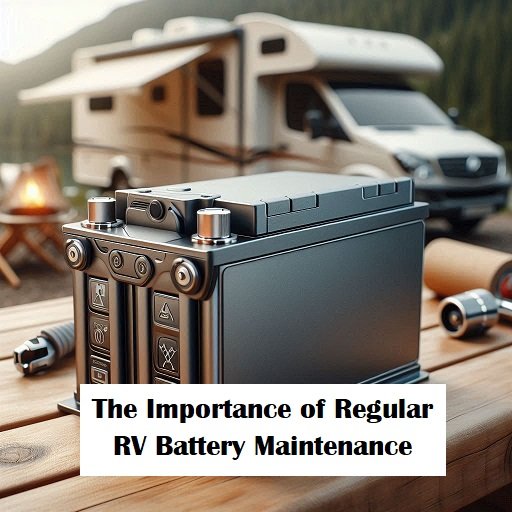

The Importance of Regular RV Battery Maintenance
Owning an RV provides the freedom to explore the open road and enjoy the great outdoors, but with that freedom comes the responsibility of maintaining your vehicle’s various systems. Among these systems, the battery is one of the most crucial components, as it powers everything from your lights and appliances to the engine itself. Regular RV battery maintenance is essential for ensuring your RV remains functional, reliable, and ready for your next adventure. In this blog, we’ll explore the importance of RV battery maintenance and provide tips for keeping your battery in optimal condition.
Understanding Your RV Battery
Before diving into maintenance, it’s important to understand the types of batteries commonly used in RVs:
- Starter Batteries: These batteries are designed to provide a quick burst of power to start the engine. They are not meant for deep cycling and are used primarily for starting.
- Deep Cycle Batteries: These batteries are built to provide a steady amount of power over a longer period. They are ideal for powering RV appliances and lights while camping.
Many RVs use a combination of both types, depending on their setup and energy needs. Knowing your battery type is crucial for understanding maintenance requirements.
The Consequences of Poor Battery Maintenance
Neglecting battery maintenance can lead to several issues that can affect your RV’s performance and reliability:
- Reduced Lifespan: A well-maintained battery can last several years, while a neglected one may fail within just a couple of seasons. Poor maintenance practices, such as allowing the battery to discharge completely or failing to clean terminals, can significantly shorten its lifespan.
- Decreased Performance: Dirty or corroded terminals can cause poor electrical connections, resulting in reduced power output. This can lead to dim lights, slow-starting engines, and an inability to power appliances.
- Increased Replacement Costs: Frequent battery replacements due to neglect can be costly. Regular maintenance helps you avoid the expense of premature battery failure.
Regular Maintenance Practices
To ensure your RV battery remains in excellent condition, incorporate the following maintenance practices into your routine:
Check Battery Fluid Levels
For lead-acid batteries, regularly check the fluid levels:
- Maintain Proper Levels: Ensure that the electrolyte (water and sulfuric acid mixture) covers the battery plates. If the levels are low, top them off with distilled water, never tap water, as it may contain minerals that can damage the battery.
- Avoid Overfilling: While it’s important to maintain fluid levels, avoid overfilling, as this can lead to spillage and corrosion.
Clean Terminals and Connections
Corrosion can build up on battery terminals and connections, leading to poor performance:
- Disconnect the Battery: Always disconnect the battery before cleaning to avoid electrical shorts or sparks.
- Use a Cleaning Solution: Clean terminals with a mixture of baking soda and water to neutralize any acid and remove corrosion. Scrub with a wire brush or toothbrush and rinse with clean water.
- Reconnect Securely: After cleaning, ensure all connections are tight and secure to promote good electrical conductivity.
Inspect for Damage
Regularly inspect your battery for any signs of damage:
- Look for Cracks and Leaks: Inspect the casing for cracks, bulges, or signs of leakage. If you notice any damage, it’s essential to replace the battery immediately.
- Check for Swelling: Swollen batteries may indicate overcharging or internal damage, and they should be replaced promptly.
Test Battery Performance
Regularly testing your battery’s performance can help catch potential issues early:
- Use a Multimeter: Test the battery’s voltage with a multimeter. A fully charged lead-acid battery should read around 12.6 volts or higher. If the voltage is significantly lower, it may indicate a need for charging or replacement.
- Load Testing: Consider performing a load test, which checks how the battery performs under strain. Many auto parts stores offer free load testing, which can help assess battery health.
 Optimal Charging Practices
Optimal Charging Practices
Proper charging is vital for battery health:
- Use the Right Charger: Use a charger designed for your battery type. Avoid using a standard automotive charger for deep cycle batteries, as it can overcharge them.
- Charge Regularly: If your RV is not in use for extended periods, make sure to charge the battery periodically to keep it healthy. Consider using a smart charger that automatically adjusts the charging rate to prevent overcharging.
Store Batteries Properly
When storing your RV for the off-season, proper battery storage is essential:
- Disconnect Batteries: Disconnect the batteries to prevent parasitic drain from electrical components.
- Store in a Cool, Dry Place: If possible, remove the batteries and store them in a cool, dry location to protect them from extreme temperatures.
- Use a Battery Maintainer: Consider using a battery maintainer or trickle charger during storage to keep the battery charged without overcharging.
Extend the Life of Your Battery
Regular RV battery maintenance is crucial for ensuring your vehicle remains functional and ready for your next adventure. By incorporating routine checks, cleaning, and proper charging practices, you can extend the life of your battery, improve performance, and avoid costly replacements. A little proactive care goes a long way in keeping your RV powered and ready for exploration. So, make battery maintenance a priority, and enjoy the freedom of the open road with peace of mind!

